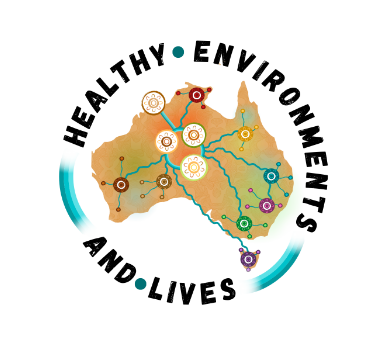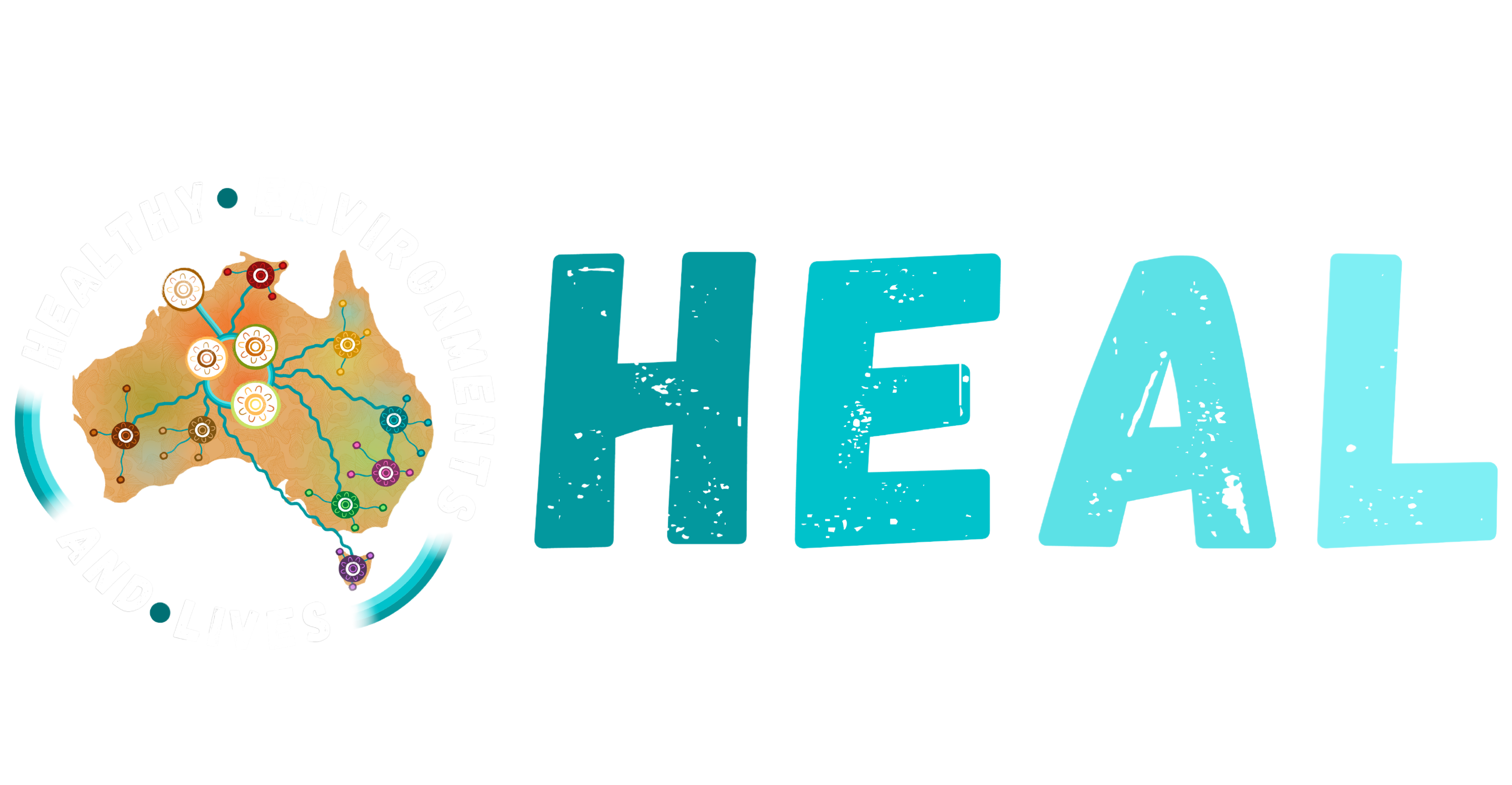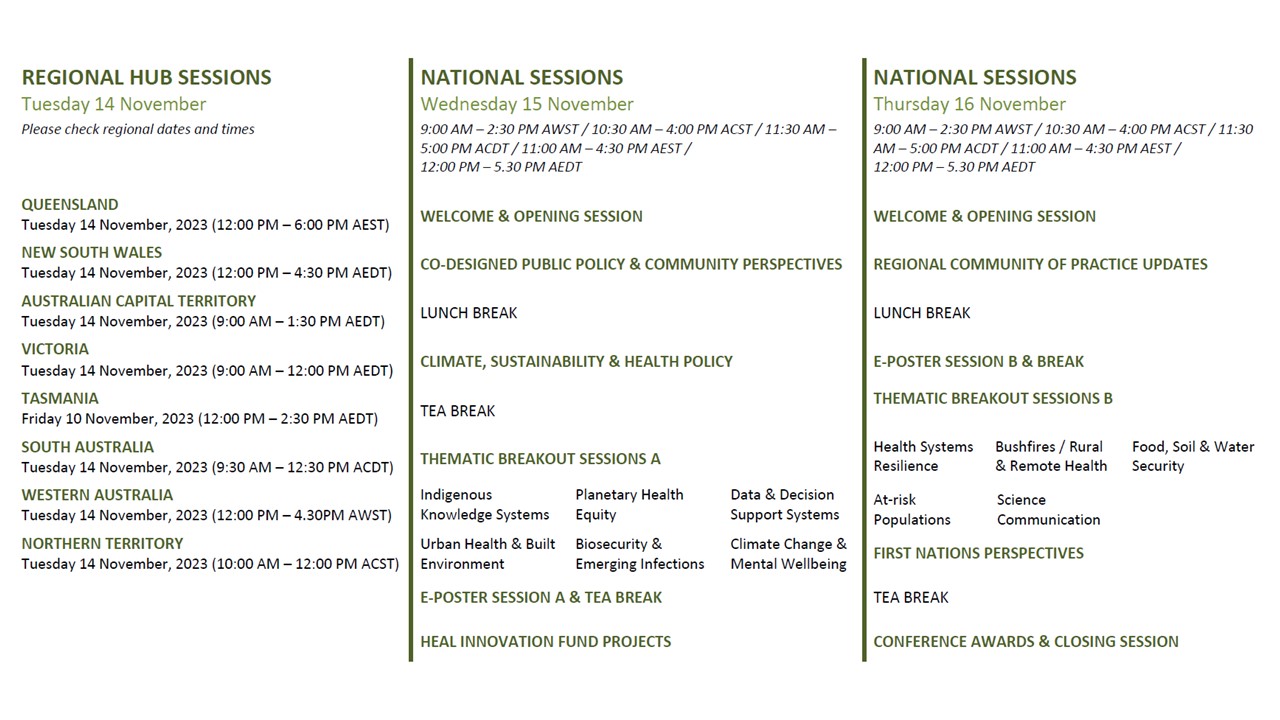

The HEAL Network is hosting its annual conference from 14-16 November 2023, building on the strong success of its first two conferences in 2021 and 2022. HEAL 2023, with the theme of ‘Collective Action for Health, Environment and Climate’, will provide a dynamic, inclusive and decentralised platform for diverse research, policy and practice communities within the Network to come together sharing knowledge, evidence and ideas.
Over three days, HEAL 2023 will deliver opportunities to discuss the leading health, climate and environmental challenges we face in Australia, the Asia-Pacific region and internationally, as well as how the HEAL Network is contributing to solutions to these challenges through shaping innovative research to support Australia’s first National Health and Climate Strategy, and helping to implement new practices such as more sustainable healthcare and climate-resilient communities.
In line with HEAL’s core commitment to supporting and elevating Australian First Nations leadership, we will be showcasing examples of Indigenous research excellence and highlighting inspiring case studies from Aboriginal and Torres Strait Islander communities who are on the frontlines of climate and environmental change. The hybrid conference will be delivered online nationally and internationally, and in-person at eight regional nodes across Australia, providing multiple avenues for delegates to participate and connect with each other.
HEAL strives to increase sustainability and reduce our carbon footprint as part of our commitment to improving the health of all people and the environment, and the HEAL 2023 conference has been designed to reflect this ethos. The hybrid format of the conference, with full online coverage and regional in-person sessions in all Australian states and territories, aims to stimulate interaction and minimise travel.
Prof Sotiris Vardoulakis and A/Prof Veronica Matthews HEAL2023 Conference co-chairs.
- Aboriginal and Torres Strait Islander health and knowledge translation for building resilience to environmental change
- Health system resilience to climate change and sustainability
- Bushfires, air pollution, heatwaves, and other extreme events, and their impact on physical, mental, and community health
- Food, soil and water safety and security in a changing environment
- Biosecurity, COVID-19 and emerging infections in the context of environmental change
- Urban health, built environment and nature based solutions
- Rural and remote health and climate-related disasters
- Clean energy solutions for healthy environments and lives
- At-risk populations, early life effects and life-course solutions
- Data and decision support systems for environmental health applications
- Science communication, citizen science, and risk perception
- Planetary health equity
- Climate change and mental wellbeing
- Environmental change and health in the Asia-Pacific region
Speakers
Professor
Sotiris
Vardoulakis
Director of the Healthy Environments And Lives (HEAL) National Research Network & Australian National University
Associate Professor
Veronica
Matthews
University Centre for Rural Health, The University of Sydney
Dr
Kimberly
Humphrey
Public Health Medical Consultant and Climate Change Lead
SA Department for Health and Wellbeing
Professor
Lucie
Rychetnik
Co-Director of The Australian Prevention Partnership Centre & University of Sydney
Associate Professor
Rhys
Jones
University of Auckland
Sonia
Roschnik
Executive Director,
Geneva Centre of Healthcare Leadership for Sustainability
Dr
Aditya
Vyas
Deputy Director,
World Health Organisation Collaborating Centre for Climate Change and Health Impact Assessment
Chelsea
Hunnisett
Policy and Advocacy Specialist, Climate and Health Alliance
Emeritus Professor
Carmen
Lawrence
School of Psychological Science, University of Western Australia.
Professor
Sandra
Creamer
School of Public Health
University of Queensland
Dr
Kate
Wylie
Executive Director,
Doctors for the Environment Australia
Billy
Quinn
Director, National Climate Risk Assessment
Department of Climate Change, Energy, the Environment and Water
A/Prof
Linda Payi
Ford
Faculty of Arts and Society
Charles Darwin University
Hon
Ged
Kearney
Assistant Minister for Department of Health and Aged Care
Joan
Carling
Executive Director,
Indigenous Peoples Rights International
Mara
West
Manager, Kulunga Operations
Telethon Kids Institute
Prof
Rebecca
Bentley
Melbourne School of Population and Global Health,
University of Melbourne
Follow us on:


